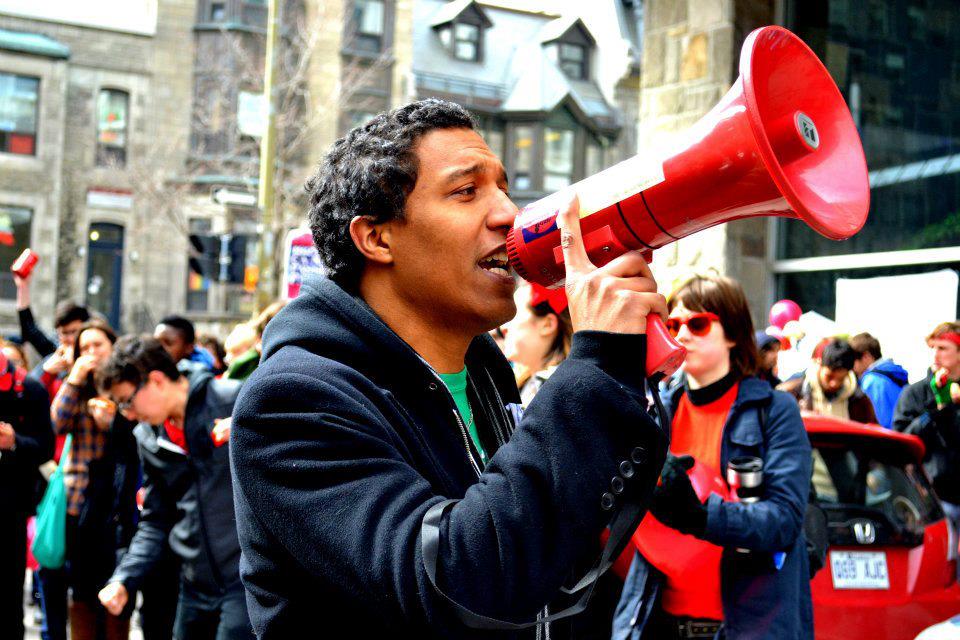Green Party candidate Chad Walcott hopes to be a catalyst for change.
“Each different experience that I’ve had informed the next, and I’ve taken away something important from each one,” said Chad Walcott, a Concordia political science and government alumnus. Particularly, he’s learned how to communicate with people; how to get them motivated and wanting to take action on a given issue, he said.
Walcott is the Green Party of Quebec’s candidate for the borough of Notre-Dame-de-Grâce (NDG) in the upcoming provincial election. It’s Walcott’s first time appearing as a candidate affiliated with the Green Party of Quebec, according to his candidate profile.
Walcott said he was introduced to politics in 2012 when his time as External Vice President of the Concordia Student Union (CSU) coincided with the tuition hike protests. During this movement, Walcott was actively involved in many demonstrations, according to his profile.
“It was a very formative experience,” said Walcott, during an interview with The Concordian. “The power of people was really what stood out to me. That campaign gave me a taste for provincial politics that I couldn’t let go of.”
Walcott has a rich history of working with non-profit organizations (NPOs). After his time at Concordia, he worked with at-risk youth and children for about six years. “Then I went to work for the Jewish General Hospital raising money for cancer,” the candidate said. His involvement with various NPOs is, in part, what motivated him to run for the Green Party. “Having worked in a few [NPOs] I know that part of the struggle is finding funding for their core mission,” said Walcott.
Currently, Walcott said, when NPOs apply for government grants, they have to “fit projects into very narrow boxes [and] bend over backwards to try to see how a given grant will fit in their larger mission.” According to Walcott, a review of funding structure on the provincial level is needed in order to address this issue.
Another change that Walcott calls for in his campaign platform is increased representation of minority groups in provincial government. As a person of colour, he emphasized the importance of encouraging minority communities to mobilize and draw attention to their issues. “If I were to be elected I [would hope] to be a catalyst for those kind of mobilizations,” he said.
One promise in the Green Party’s platform, according to the CBC, calls for the formation of a permanent council to address racism in Quebec. This past summer, according to the Montreal Gazette, former Project Montreal candidate Balarama Holness circulated a petition calling for the city of Montreal to hold a public consultation on racism and discrimination. According to the same article, the petition received more than 20,000 signatures.
Initially launched in February, the petition was at first deemed inadmissible on both the municipal and provincial levels before being accepted just recently, said Walcott. “The government doesn’t want to look at the fact that […] there are issues of systemic racism in Quebec,” he said. “They just refuse to look into it.” Walcott believes that, at a minimum, the council that the Green Party is suggesting should formulate an annual report assessing systemic racism, which will influence government policy. “Our voice is not represented right now in parliament,” he said. “I want to see that changed.”
Walcott also calls for free public transportation for all. This initiative would be partly funded through a carbon tax on gasoline, according to the Green Party’s website. Walcott has been heavily criticized for taking this stance, particularly from those who predominantly use vehicles not wanting to subsidize other people’s transportation costs. “But we’re looking at multiple sources of revenue to fund this,” he said, such as increasing taxation on large corporations, particularly mining companies.
One of the ambitious, long-term goals for the Green Party, Walcott said, “is to have [the] downtown core and the island of Montreal be essentially car-free.” The Green Party hopes to accomplish this through a combination of incremental changes, starting with improving public transportation infrastructure, abolishing limitations on carpooling legislations and encouraging carsharing programs, according to its website. “We’re not completely deleting cars from the urban landscape,” said Walcott, “we’re using them better.”
Walcott is aware that the Green Party of Quebec’s platform is ambitious and it’s unlikely to be voted in after this upcoming election. “Because of the position that we occupy in the political spectrum, we need to […] be ambitious,” he said. Walcott hopes that his and the party’s platform will influence other parties to follow in their stead. On Tuesday Sept. 11, Premier Philippe Couillard announced that, if re-elected on Oct. 1, he will make public transportation free for all full-time students and seniors, according to the CBC.
“This is not something where we would just flip the switch and now everything’s eco-friendly,” said Walcott. “[Large-scale] change is something gradual.”
Photo courtesy of interviewee.




